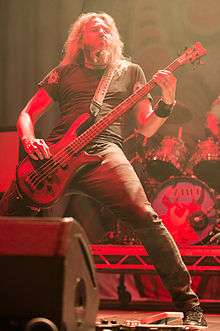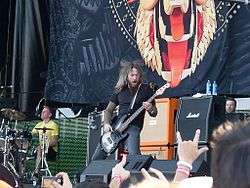Troy Sanders
| Troy Sanders | |
|---|---|
 Troy Sanders performing in 2014 | |
| Background information | |
| Birth name | Troy Jayson Sanders [1] |
| Born | September 8, 1973 |
| Origin | Atlanta, Georgia, United States |
| Genres | |
| Occupation(s) | Musician, songwriter |
| Instruments | Bass guitar, vocals, keyboards, guitar |
| Years active | 1990–present |
| Labels | Relapse, Reprise |
| Associated acts | Mastodon, Killer Be Killed, Social Infestation, Bloodsimple, Dozer, Yakuza, Metal Allegiance, Gone Is Gone |
| Website |
mastodonrocks |
Troy Jayson Sanders (born September 8, 1973) is an American musician, singer, and songwriter best known as a member of the Atlanta, Georgia metal band Mastodon, in which he plays bass and shares lead vocal duties with guitarist Brent Hinds and drummer Brann Dailor.
Biography
Sanders first played when he had picked up his older brother's bass and decided to try it out, even though the bass was strung for a lefty, and he was right-handed. A few months later, he had talked his dad into buying him a bass. He started first playing in such bands as Four Hour Fogger, Knuckle and Puaka Balava.[2] In 1995, Sanders joined the grindcore-band Social Infestation as the bass player. Social Infestation has released one EP and two full length albums. The band hasn't released any material since 2000 and are seemingly taking a long hiatus or the band has split.[3]
In 2000, Sanders met Brann Dailor and Bill Kelliher along with Brent Hinds at a High on Fire show and later formed Mastodon. The four began a new musical venture with then singer Eric Saner, touring the southern USA, working 40-hour weeks and committing to the band in their spare time. The band's mainstream success would ensue after Saner left the band, pushing Sanders to the forefront not just as a bassist, but as a vocalist also, the duties of which he would share with Hinds.
In 2012, Sanders joined the supergroup Killer Be Killed, founded by The Dillinger Escape Plan vocalist Greg Puciato and Soulfly/ex-Sepultura frontman Max Cavalera. The band had slowly been working on a lineup and material before announcing its name in October 2013,[4] along with their signing to Nuclear Blast Records.[5] The release date for their self-titled debut record is May 13, 2014.[6]
In 2016, Sanders formed Gone Is Gone, a supergroup also consisting of Troy Van Leeuwen, a guitar player for Queens of the Stone Age, Tony Hajjar, the drummer for At the Drive-In, and Mike Zarin,[7] a multi-instrumentalist who appeared with Van Leeuwen on Sweethead's Descent To The Surface. An EP will be released in the summer of 2016, and the band is developing a studio album for release later in the year.[8]
Personal life
Sanders is married and has two children, a son and a daughter.[9] Sanders has two brothers, Kyle and Darren, who are both involved in music. Kyle was the bassist of Bloodsimple, and is in MonstrO, and metal supergroup Hellyeah; while Darren is "a one man road crew" and bass tech for Mastodon.
Influence and style
Musical style
Sanders plays primarily fingerstyle, although he sometimes uses a pick, and usually steps out of the guitar parts in Mastodon, and composes his basslines on his own. He has shown a wide variety of playing styles and techniques, so he is known as a very flexible player.
Singing style

Sanders performs clean and harsh vocals in Mastodon, where he shares lead vocal duties with Brent Hinds and Brann Dailor. His harsher vocal style is similar to Dave Edwardson of Neurosis and Buzz Osborne of The Melvins, utilizing low growls but not low enough to be death grunts. His harsh vocalism was largely applied in Mastodon's earlier Lifesblood and Remission. In Mastodon's more recent albums, Leviathan through Emperor of Sand, Sanders utilizes a different range of clean vocals along with his harsher style.
Influences
Sanders has cited Cliff Burton from Metallica, Gene Simmons from Kiss, and Phil Lynott from Thin Lizzy as some of the major influences on his bass playing. He has also stated in interviews that his favorite albums are Men At Work's Business As Usual, Neurosis' Times Of Grace, and George Jones' Anniversary - 10 Years Of Hits. Adding to that list, in a 2005 interview,[10] he also mentioned Through Silver in Blood by Neurosis, Sailing the Seas of Cheese by Primus, Melvins' Stoner Witch, Metallica's Ride the Lightning, and White Pony by Deftones as some of his favorites.
Gear and equipment
Sanders owns a wide variety of basses from different companies, from Godlyke, through Yamaha, Ibanez, Fender, Wal, to Warwick[11] most recently. His most notable basses are:
- Fender Prophecy II (Natural)
- Fender Precision Bass American Deluxe (Silverburst with Black pickguard)
- Fender Jazz Bass American Deluxe (Black with Gold anodized pickguard)
- Fender Jaguar Bass Deluxe (Hot Rod Red)
- Fender Jaguar Bass Signature (Silverburst with Black pickguard)
- Squier Jaguar Bass Signature (Silverburst with Black pickguard)
- Warwick Streamer Stage II from the Custom Shop in Nirvana Black OFC[11]
- Yamaha BB2004 (Black)
- Yamaha BB2024 (Black)
- Yamaha TRB1004j (Black)
- Zon Sonus with a Precision-Jazz pickup configuration
Sanders also uses a variety of amps, pedals and effects. He uses a TC Electronic Blacksmith amplifier and cabinet, an Orange AD200B cabinet and SP410 cab, an Ampeg SVT-VR stack and SVT-4 PRO head, Mesa 8x10 cabinets, a Mesa Engineering Titan V12 head, a Mesa Boogie Big Block 750 head and a 4x12 cab (synth pedals). As for pedals, he was seen using MXR Octave Deluxe, MXR El Grande Bass Fuzz, vintage Sovtek Big Muff Pi, Cobrahawk B12 Fuzz, Moog MF-104SD Moogerfooger Analog Delay, Moog Taurus Bass Pedals, Electro-Harmonix POG Polyphonic Octave Generator, Digitech Bass Whammy, Boss RV-5 Digital Reverb, Boss GEB-7 Bass Equalizer, Morley Wah Pedal, Voodoo Lab Pedal Power 2 Plus, Sanford Bluebeard Fuzz, Fern DI, Wren and Cuff Tall Font Russian, TC Electronic Corona Chorus pedal, and a Monster Power Pro 2500 power conditioner.
Discography
Social Infestation
- Social Infestation (1996)
- Redemption Is Only Skin Deep...It's Time to Cut Deeper (1998)
- Lasciate Ogni Speranza (2000)
Mastodon
- Remission (2002) - Bass, vocals
- Leviathan (2004) - Bass, vocals
- Blood Mountain (2006) - Bass, vocals
- Crack the Skye (2009) - Bass, bass synth, vocals
- The Hunter (2011) - Bass, vocals
- Once More 'Round the Sun (2014) - Bass, vocals
- Emperor of Sand (2017) - Bass, vocals, bass pedals
Killer Be Killed
- Killer Be Killed (2014) - Bass, vocals
Gone Is Gone
- Gone Is Gone (2016) - Bass, vocals
- Echolocation (2017) - Bass, Vocals
Guest appearances
- "Back to the Mountain" by Yakuza on the album Samsara, (vocals).
- "Until Man Exists No More" by Dozer on the album Through the Eyes of Heathens, (vocals).[12]
- In 2013, Sanders starred in a commercial for Orange Amplification's Micro Terror.[13]
- "Let Darkness Fall" by Metal Allegiance on the album Metal Allegiance, (vocals)
- "Liars & Thieves" by Metal Allegiance on their second album Volume II - Power Drunk Majesty (vocals)
References
- ↑ Sanders, Troy Jayson. "Songwriter/Composer: SANDERS TROY JAYSON". Broadcast Music, Inc. (BMI). Retrieved July 24, 2015.
- ↑ "Troy Sanders - Encyclopaedia Metallum". The Metal Archives. Retrieved 2014-06-25.
- ↑ "Social Infestation - Encyclopaedia Metallum". The Metal Archives. Retrieved 2014-06-25.
- ↑ Project Featuring MAX CAVALERA, GREG PUCIATO, TROY SANDERS Gets Name Blabbermouth.net. October 18, 2013. Retrieved October 20, 2013.
- ↑ Max Cavalera/Greg Puciato/Troy Sanders Supergroup Finds a Label Home MetalSucks. October 15, 2013. Retrieved October 20, 2013.
- ↑ Killer Be Killed Featuring Cavalera, Puciato, Sanders: Debut Album Cover Artwork Revealed Blabbermouth. March 10, 2014. Retrieved March 10, 2014.
- ↑ https://www.rollingstone.com/music/news/mastodon-at-the-drive-in-qotsa-members-form-supergroup-gone-is-gone-20160413
- ↑ http://pitchfork.com/news/64785-mastodon-queens-of-the-stone-age-at-the-drive-in-members-form-supergroup-gone-is-gone-tease-new-song-violescent-listen/
- ↑ Archived November 24, 2011, at the Wayback Machine.
- ↑ Archived November 13, 2013, at the Wayback Machine.
- 1 2 Villano, Freddy (January 22, 2015). "Troy Sanders Keeps it Low & Rocking with Mastodon". Bass Player. Retrieved May 25, 2015.
- ↑ "Literature Study Guides - By Popularity". eNotes.com. Retrieved 2014-06-25.
- ↑ "Orange Amplification's Micro Terror Saves The Day For Mastodon's Troy Sanders". Blabbermouth.net. 2013-01-09. Retrieved 2014-06-25.